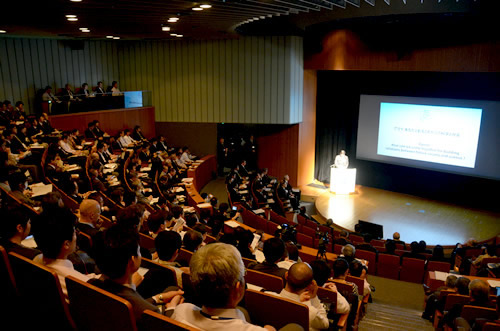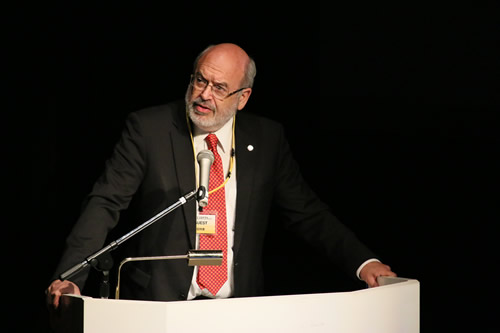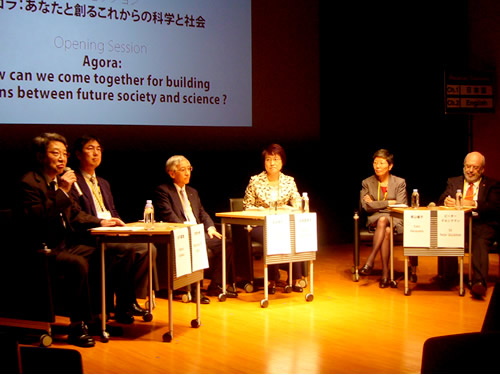
今年で9年目を迎えるサイエンスアゴラ。2011年の東日本大震災や、昨今の科学コミュニケーションの概念そのものの広がりによって、科学リテラシーや科学者自身による市民とのコミュニケーション、また政府の政策立案に対して科学者がどのように関わるべきか、といった課題が浮上してきました。
This is the ninth year Science Agora has been held. Through the experience of the 2011 Great East Japan Earthquake and through the spreading of the idea of “science communication” in general in recent years, various issues have come to the surface, including scientific literacy, direct communication by scientists with citizens, and how scientists should be involved in government policymaking.
現代は、科学技術の楽しさを伝えるだけではなく、科学が社会においてどのような位置づけをもち、科学者がどのように情報発信や対話を行っていくのかが求められる時代とも言えます。今回のイベントは、まさにそうした科学と社会のあり方を改めて見つめなおすひとつのきっかけとなりました。
In today’s society, there is a need to clarify the roles of science in society and consider how scientists should disseminate information and have dialogues with non-scientists, in addition to communicating the excitement of science and technology. The event gave an opportunity to reexamine what the relationship between science and society should be, including the above-mentioned points.
開幕に先立ち、政府首脳に対して科学的な立場から助言を行っている、ニュージーランド政府首席科学顧問のピーター・グルックマン氏より基調講演がなされました。
To mark the opening of the event, Peter Gluckman, the Chief Science Advisor of the New Zealand government gave the keynote speech.

科学技術の進歩は、経済発展や私たちの生活改善など、いまや人類の未来にとって欠かせないものとなりました。同時に、イノベーションによるCO2排出量の増加や人口増加、さらには技術による価値観や倫理観の対立を生むなど、科学技術が問題の原因を生み出している、という事実も見逃してはなりません。
Scientific and technological progress has become essential for the future of humanity, including economic development and the improvement of our living conditions. At the same time, we must not overlook the fact that science and technology have created problems, such as the CO2 emissions increase and the population increase caused by technological innovation, as well as the conflicts between different values and morals caused by science.
グルックマン氏は「科学の進歩を、社会がそのまま受け入れるとは限りません。進歩すればそれでいい、と科学者が考えていては、社会において矛盾や対立を発生させてしまいます」と指摘。
Sir Peter Gluckman pointed out that society does not necessarily accept scientific progress unconditionally, and that contradictions and conflicts could occur in society if scientists simply believe that all we need is progress.
技術の進歩そのものだけではなく、社会においてどのように受け入れられるかといった「価値観を伴った科学」を考えなければいけないと言います。また、社会問題を科学がすべて解決するわけでもありません。もちろん技術の進歩によって選択肢をつくることはあるかもしれませんが、科学も万能ではないことを科学者やあらゆる人たちが認識しなければなりません。さまざまな事件や事故によって、科学の信頼自体が揺れ動かされている昨今、科学が可能なものと可能でないものを理解したうえで、市民に対して適切な情報開示やコミュニケーションを行うことの重要性がますます求められています。
Sir Peter Gluckman pointed out that we must think about “science with value” where we consider how new technologies can be accepted in society, rather than simply pursuing technological progress alone. Science cannot solve all social problems. Technological progress may well result in more options, but everyone including scientists must recognize the fact that science is not omnipotent. Various incidents and accidents have shaken people’s trust in science in recent years. It is becoming increasingly important to disclose and communicate information to citizens appropriately, based on the understanding of what science can do and cannot do.
こうした状況のなか、政府はイノベーションを推進するために研究開発に対して予算を投入する動きが起きています。経済発展だけではなく、環境や保健科学、生物保護、公衆衛生の改善など、さまざまな分野に対する技術への期待は日々高まるばかりです。そのためにも、国家間の連携や世界の科学者同士のコミュニケーションの密度も高めていかなくてはなりません。
There is a trend for governments to allocate budgets for research and development with the aim of promoting technological innovation. Expectations for technological contributions not only to economic development but also to various other fields are increasing day by day. These fields include the environment, health science, conservation of organisms and public hygiene improvement. In order to meet these expectations, it is necessary to increase the opportunities and depth of cooperation between states and communication between scientists around the world.
さらに、グルックマン氏が政府首席科学顧問を務めているように、科学者自体が政府に対して助言を行う場も増えてきました。「政府の現場と科学とのつながりをどのように行うか。科学への信頼と連携性を高めるためにも、科学分野の考えを政策立案者に反映する助言を行わなければいけないのです」(グルックマン氏)。
Opportunities for scientists to directly give advice to governments are increasing. Sir Peter Gluckman serving as the Chief Science Advisor of the New Zealand government is one such example. Sir Peter Gluckman raised the question of how we should connect the government arena and science and said that scientists must give advice that will feed policymakers with ideas from the field of science, in order to increase trust in science and cooperation between the government and science.
グルックマン氏は、科学的助言に対して3つのポイントがあると言います。一つ目は政治家と専門家が集まり、熟議を重ねる正式なアドバイス。二つ目は科学者と政治家が適宜コミュニケーションを行い、適切な政策立案を行うための非公式なアプローチ。三つ目は災害時などの緊急時において、イシューを即座に決定する緊急性の高い助言です。
Sir Peter Gluckman raised three important types of scientific advice. The first type is official advice given through repeated deliberation between politicians and experts who gather around one table. The second type is an informal approach for appropriate policymaking where scientists and politicians have communication when the need arises. The third type is highly urgent advice needed to make immediate decisions on issues in emergencies such as in times of disaster.
科学者は、これまでは公式のアドバイス以外にはあまり積極的に政策立案に関わってきませんでした。今後は、社会において科学を有用に活用するために、積極的な助言やコミュニケーションを図る努力が求められるなど、科学者のあり方自体が見直されているのです。
Most of the time, scientists have not actively become involved in policymaking apart from giving official advice. The quality and roles of scientists are being reconsidered, for example they are now expected to make efforts to give advice and have communication proactively, in order to make effective use of scientific knowledge in society.

基調講演のあとは、パネルディスカッションが行われました。登壇したのは、岡山大学教授の狩野光伸氏、朝日新聞社編集委員の高橋真理子氏、産業競争力懇談会(COCN)実行委員の富田達夫氏、内閣府総合科学技術・イノベーション会議議員の原山優子氏、基調講演にも登壇したピーター・グルックマン氏、モデレーターに横浜国立大学教授の金子直哉氏。金子氏は、グルックマン氏の講演の流れを受けつつ、「科学と社会との関係において、科学者だけではない多様なステークホルダーとの関係を考えるためのパネルセッションにしたい」と、ディスカッションの方向性について提示。登壇者それぞれの意見をもとに活発な議論をしていきたい、と話を促しました。
The keynote speech was followed by a panel discussion. Panelists were: Mitsunobu R. Kano, Professor at the University of Okayama, Mariko Takahashi, Senior Staff Writer at the Asahi Shimbun, Tatsuo Tomita, Chairman of Fujitsu Laboratories Ltd., Yuko Harayama, Executive Member of the Council for Science, Technology and Innovation at the Cabinet Office of Japan, and Sir Peter Gluckman who gave the keynote speech. Naoya Kaneko, Professor at Yokohama National University served as the moderator. Firstly, each panelist talked about their ideas for the relationships between science and society.
狩野氏は、科学を目的、方法、結果、考察、講評といったそれぞれのフェーズで考えるべきだと指摘。市民が科学に求めるものと科学者がもっている目的のズレを認識し、目的を共有した上で科学がもつ創造性や客観性のある研究を行うことが重要だと語りました。また、研究によってどのような結果が得られるか、逆にどのような結果が得られないのかを論理化し、目的に対してどこまで達成しているのかを伝える努力をすることが求められると言います。それを踏まえて、科学は誰のためのものか、科学が社会や人々のこれからに対して貢献しているのかを科学者は再認識するべきだとコメントしました。
Prof. Kano pointed out that science should be examined at each stage including the objectives, methods, results, examination and review. He explained that it is important to recognize the differences between what citizens expect from science and scientists’ objectives, and to share common objectives before conducting the creative and objective research that science can offer. He also explained that there is a need to establish a logical explanation of the kinds of results which could and could not be obtained from the research, and to make efforts to communicate the extent to which the research has achieved the objectives. He also commented that, based on the above-mentioned attitude, scientists should reexamine for whom science exists and whether or not science is contributing to the future of society and people.
高橋氏は、欧州の統一的な研究体制を推進するための会議である「ユーロサイエンス・オープンフォーラム」が科学者の草の根活動から生まれてきたことを踏まえ、国を越えて科学者が市民との対話を実現している動きに注目。サイエンスアゴラは市民の対話を促進する場としての意義を認めつつも、足りないものとして「科学者による科学者のための分野を超えたオープンな議論」、「多様性」、「アジアにおける組織的な共同研究体制」と指摘しました。科学者同士の連携や科学者自身の能動的な活動が今後ますます必要になるとコメント。「みんなでつながりサイエンスを良くする場として、サイエンスアゴラを考えていきましょう。科学のためにアゴラを利用することが大切です」と語る高橋氏は、多様な議論と能動的な活動を活発にし、そこから生まれた実績を広く伝えていくことが、社会と科学の関係性がより良いものへ進むと述べました。
Ms. Takahashi referred to the Euroscience Open Forum (ESOF) which came out of scientists’ grassroots activities, and drew attention to their activities for achieving dialogues between scientists and citizens across borders. While recognizing the significance of Science Agora as an opportunity to promote dialogues between scientists and citizens, Ms. Takahashi pointed out what is missing in Japan: “open cross-field discussions between scientists, for scientists,” “diversity” and “an organized joint research framework in Asia.” She also commented that the need for cooperation between scientists and proactive activities by scientists would increase in the future. She said, “Let’s consider Science Agora as an opportunity to improve science through the participants networking with each other. It is important to make use of Agora for science.” She also explained that stimulating diverse discussions and proactive scientific activities as well as passing the resulting outcomes on to society will effectively help improve the relationships between society and science.
富田氏は、産業競争力懇談会(COCN)において、企業同士が連携しイノベーションの推進のため77もの推進プロジェクトを立ち上げたことについてプレゼンテーションを行いました。内閣府が主導するSIP(戦略的イノベーション創造プロジェクト)にも採択された活動を行っているとし、企業も今後ますます科学技術を社会のニーズに対応していくことの重要性を指摘しました。
Mr. Tomita gave a presentation about the Council on Competitiveness-Nippon (COCN) where innovation is being promoted through cooperation between companies with 77 promotion projects being launched. He explained that one of its activities was adopted in the state’s Cross-ministerial Strategic Innovation Promotion Program (SIP), and pointed out the importance of companies continuing to work to develop and use science and technologies that meet the needs of society.
原山氏は、今回のサイエンスアゴラのテーマである「あなたとつくる」の「『あなた』とは科学者であり、ひとりひとりの市民でもある」とコメント。科学者のみならず、すべての人が科学と社会のあり方について考え、コミュニケーションから更に一歩踏み込んだ「ともにつくりだす」ための共同作業を行うためにも、オープンな活動がこれから求められてくると語りました。
Dr. Harayama commented that the “we” mentioned in the title of the program refers to scientists and individual citizens. She explained that open activities would be needed in the future in order for all the citizens rather than just scientists to think about how science and society should be, and to go further than “communication” and “come together for building relations between future society and science.”
「既存の概念の延長ではなく、これまでにない新しい可能性を追求するためのきっかけをつくりだすこと。科学において今までにない飛躍やイノベーションを起こすためにも、若い世代のチャレンジを推奨するような場をもうけていきましょう」(原山氏)
Dr. Harayama said, “The important thing is to create opportunities to pursue new possibilities rather than extending existing ideas. Let’s create chances to encourage new generations to tackle scientific challenges in order to achieve unprecedented leaps and innovation in science.”
各登壇者の話をうけ、グルックマン氏は「新しい技術や知識をどのように使っていくか。科学がもつリスクを社会がどのように受け止めるか、リスクに対して市民との対話をしっかりと行うことが必要です」と語り、技術がもつ良い面と悪い面をきちんと科学者が理解し、かつ、それを市民に対して理解を促進していくことの重要性を説きました。
In response to the panelists’ideas, Sir Peter Gluckman pointed out the importance of scientists properly understanding the pros and cons of technologies and promoting citizens’ understanding about them, by commenting that it is necessary to have thorough dialogues with citizens on the risks, including how new technologies and knowledge should be used and how society should treat the risks that science brings.
狩野氏や高橋氏が指摘するように、分野を越えた科学者同士のコミュニケーションを活発に行うことは今後ますます求められてきます。分野を横断する素地をつくるためにも、文系や理系、国内や国外といった考えを取り除かなければなりません。そのためにも、特に若い世代に対して幅広い科学の知識や教育の場の提供、自然科学や社会科学に関係なく科学そのものが刺激的だと感じる経験を提供することが求められます。若い世代へバトンを渡す認識を既存の科学者たちが認識し、高校生などがサイエンスアゴラに気軽に参加する機会を提供することは、今すぐにできるアクションだと登壇者たちは賛同の声をあげました。
As Prof. Kano and Ms. Takahashi pointed out, there will be an increasing need for active cross-field communication between scientists in the future. In order to create the foundation for cross-field communication, the idea of drawing a line between arts and sciences and between countries must be removed. With this in mind, there is a need to provide new generations in particular with the opportunities to gain a wide range of scientific knowledge and education, as well as the opportunities to experience the excitement of science regardless of whether it is natural science or social science. The panelists agreed that the following is an action that can be taken immediately: existing scientists recognize the importance of passing the torch to the next generation and we provide opportunities for high school students and other young people to easily participate in scientific forums such as this one.
文理の垣根を取り除き、さまざまな分野を体験できる場を提供しながら、社会における科学への理解を広げ、かつ社会における科学のあり方をあらゆる人が考えるようになることが、これからますます求められてくるといえるでしょう。
It will be necessary more than ever to increase public understanding of science and for all members of society to consider what science should be in society, through the removal of boundaries between the arts and sciences, and the provision of opportunities for people to experience various academic fields first-hand.
下記のリンクからご覧ください。